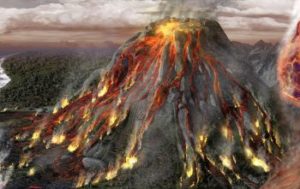by P. Homewood, Nov 3, 2022 in WUWT
Dundee University geographer Dr Martin Kirkbride said a glacier may have survived in the Cairngorms as recently as the 18th Century.
Britain’s last masses of slow-moving ice and snow were understood to have melted 11,500 years ago.
Dr Kirkbride studied the formation of corries in the Cairngorms.
A corrie is a basin-shaped feature created by glaciations in the mountains.
Using a technique called cosmogenic 10Be dating, Dr Kirkbride showed that a small glacier in a Cairngorms corrie piled up granite boulders to form moraine ridges within the past few centuries, during the period of cool climate known as the Little Ice Age.
Dr Kirkbride said: “Our laboratory dating indicates that the moraines were formed within the last couple of thousand years, which shows that a Scottish glacier existed more recently than we had previously thought.
“The climate of the last few millennia was at its most severe between 1650 and 1790.
“There are some anecdotal reports from that time of snow covering some of the mountain tops year-round. What we have now is the scientific evidence that there was indeed a glacier.”
Dundee University said scientists had speculated that glaciers may have re-formed in the Highlands around the time of this Little Ice Age but hard evidence has proved to be elusive.
Dr Kirkbride teamed up with Dr Jez Everest at the British Geological Survey in Edinburgh, and the Cosmogenic Isotope Analysis Facility at the Scottish Universities Environmental Reactor Centre in East Kilbride, to carry out the research.
…
by S. Beech, January 25, 2019 in ClimateChangeDispatch
A massive volcanic eruption in Scotland on the same scale as the infamous Krakatoa blast may have contributed to prehistoric global warming.
Scientists say that global temperatures spiked around 56 million years ago.
And a new study suggests that a major explosive eruption from the Red Hills on the Isle of Skye may have been a contributing factor to the massive climate disturbance.
Large explosive volcanic eruptions can have lasting effects on climate and have been held responsible for severe climate effects in Earth’s history.
One such event occurred around 56 million years ago when global temperatures increased by up to 8 degrees Celcius (46 degrees Fahrenheit.)
The event has been named the Paleocene-Eocene Thermal Maximum (PETM).
…
by Dr. S. Lüning & Prof. F. Vahrenholtz, in NoTricksZone
How do today’s temperatures fit into the climate-historical context?
This is one of the main tasks of today’s climate research. A group of researchers led by Milos Rydval have presented a reconstruction of summer temperatures in Scotland over the past 800 years. The results were produced from tree ring examinations.
Surprisingly, the scientists found that the current level of heat in Scotland had been reached and even exceeded several times in the past. These heat spells occurred in the 14th, 16th, and 18th centuries and each spanned over several decades (Figure 1). In between there were cold phases that fit well into the context of the Little Ice Age.
What follows is the abstract of the study published in November 2017 in the journalClimate Dynamics:
…

La géologie, une science plus que passionnante … et diverse


